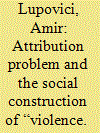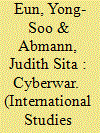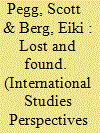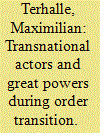|
|
|
Sort Order |
|
|
|
Items / Page
|
|
|
|
|
|
|
| Srl | Item |
| 1 |
ID:
147380


|
|
|
|
|
| Summary/Abstract |
Many scholars suggest that the difficulty of attaining cyber deterrence is due to the intrinsic characteristics of cyberspace. While this article does not aim to entirely refute this assertion, it suggests that the failure to successfully employ cyber deterrence is not determined by the technical challenges of cyberspace, but rather that the effects of these challenges are mediated through social context(s) and norms. To present this, I elaborate on the meaning of cyber deterrence and suggest that a rethinking of this term allows us to better address the various actors involved in the practices of cyber deterrence, as well as to better describe the intersections between the cyber and kinetic means affecting these practices. Building on the concept of cyber deterrence and borrowing from the constructivist approach to International Relations, I focus on how anonymity and “violence” are affected by social constructions and norms and in turn influence the success or failure of cyber deterrence. I briefly illustrate these assertions and their importance with regard to the case of Stuxnet.
|
|
|
|
|
|
|
|
|
|
|
|
|
|
|
|
| 2 |
ID:
147381


|
|
|
|
|
| Summary/Abstract |
This article examines the implications of cyberwar for national security and traditional warfare. While not making traditional war obsolete, cyber-weapons can nonetheless be force-amplifiers for kinetic attacks in future wars. Not only are cyber-weapons easier to deploy, they can also be activated much more cheaply than conventional weapons. This cost–benefit ratio levels the playing field, especially to the benefit of Third World countries which lack considerable leverage in terms of exercising traditional military power. By bringing new aspects to the theater of war, cyberwar asks us to revamp our policy and study of security, war, and power. Although it does not change the very nature of warfare which remains political, instrumental, and violent, cyberwarfare will reshape the ways in which war begins or is carried out in the near future. Our analytical and theoretical understanding of the international politics of the digital age can be enriched by taking what is happening in cyberspace more seriously.
|
|
|
|
|
|
|
|
|
|
|
|
|
|
|
|
| 3 |
ID:
147375


|
|
|
|
|
| Summary/Abstract |
What causes petro-aggression? Conventional wisdom maintains that the regime type of petrostates has significant effects on the likelihood that petrostates will launch revisionist militarized interstate disputes (MIDs). While domestic politics is an important factor that might explain the motivation and behavioral patterns of a petrostate, it says little about the international environment in which a petrostate decides to initiate conflicts. One significant factor that presents opportunities and constraints for petro-aggression is a great power alliance. In essence, the great power has strong incentives not to upset the relationship with its client petrostate ally for both strategic and economic reasons and, hence, tends not to oppose military adventurism by its ally. Consequently, the petrostate’s anticipation of great power inaction or even protection for its revisionist policy creates a moral hazard problem. Overall, by offering favorable circumstances, a great power alliance has a positive effect on petro-aggression. Although not without caveats, our large-n model and case study bear out this conclusion.
|
|
|
|
|
|
|
|
|
|
|
|
|
|
|
|
| 4 |
ID:
147379


|
|
|
|
|
| Summary/Abstract |
This article provides insights into the dangers and opportunities that the cyber realm poses to states by conducting the first comprehensive case study on Israeli use of cyberspace. Israel faces a constant barrage of cyberattacks from actors ranging from states to hacker groups to individuals. This has forced Israel to develop highly advanced capabilities. Israel has not just faced cyberattacks but has also been a leader in using the cyber realm for offense. Although the threats to Israel are severe, they are not unique; thus, Israel can serve as a model for what other states can do to effectively use cyberspace both defensively and offensively. This article offers policy recommendations as to how states can improve their cyber defenses.
|
|
|
|
|
|
|
|
|
|
|
|
|
|
|
|
| 5 |
ID:
147377


|
|
|
|
|
| Summary/Abstract |
De facto states are typically seen as marginal actors in the international system. Although they control territory and provide governance, their claims to sovereignty remain largely unrecognized. It is widely believed that such entities are either ignored or viewed with hostility by the vast majority of sovereign states. Rather than theoretically presume such relations, we empirically investigate de facto state–great power interactions through the use of a novel data set comprising 448 “WikiLeaks” US diplomatic cables from 2003 to 2010. Specifically, we examine US relations with the four de facto states of Abkhazia, Nagorno-Karabakh, Somaliland, and Northern Cyprus to test four different hypotheses designed to explain what determines the degree of US support or hostility toward individual de facto states. We find that hostility/support and isolation/engagement often go hand in hand, yet vary significantly across our selected cases. De facto states are not treated as homogenous entities and US foreign policy is quite capable of discriminating between them and calibrating its interactions with them.
|
|
|
|
|
|
|
|
|
|
|
|
|
|
|
|
| 6 |
ID:
147378


|
|
|
|
|
| Summary/Abstract |
This article rests on the assumption of the “complexity, messiness, power relations, and contested character of the contemporary dualistic system,” which comprises great powers and “superimposed, functionally differentiated global subsystems of world society” (Cohen 2012:5). The article argues that this framework is being shaped by the current transition of global order. In turn, this raises the question how the state-led negotiation of today's order transition can be understood against the backdrop of a post-Westphalian environment. The article challenges the widespread argument pertaining to the “autonomy of transnational actors” by suggesting that the influence of nonstate actors is dependent on a particular institutional context in which the key political questions framing a social order are settled. Whereas research on international institutions and their design simply assumes that this is the case, here it is argued that unless these framing patterns are agreed upon by major powers, the respective order and its elements, that is, institutions and regimes, remain contested or deadlocked. When this happens, the political impact of non-state actors is largely neutralized or strongly weakened and their effective autonomy from great powers is minimized.
|
|
|
|
|
|
|
|
|
|
|
|
|
|
|
|
| 7 |
ID:
147376


|
|
|
|
|
| Summary/Abstract |
Frederick Jackson Turner (1861–1932), the American historian known for devising the “Frontier Thesis,” said that the United States was “an empire” and that expansion was the driving force of the nation's history (Colley 2006:373). Despite this assertion by so prominent an American intellectual, Colley points out that US imperialism is generally still only seen to operate in a very “narrow” sense, namely “in terms of overseas activities” (Colley 2006:373). One consequence of this historical myopia is that the nation, at least until the late nineteenth-century conflict with Spain, seems to have escaped association with empire. This paper examines how and why this is the case. It does so by focusing upon a method of expansion often overlooked when examining US history, namely that the nation attained a great deal of its territory not just by warfare but also through purchase or lease. Thus, this work suggests that the United States' association with empire is far more profound than many acknowledge. In doing so, it also draws attention to an understudied colonial process that has profound implications for Westphalian conceptions of sovereignty, empire, and international order.
|
|
|
|
|
|
|
|
|
|
|
|
|
|
|
|
|
|
|
|
|